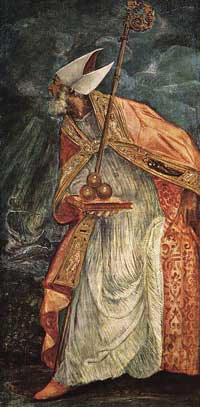|
 St. Nicholas is the
Saint better known as "Santa Claus" (Sinterklaas in the
Dutch whence "Santa Claus" comes). His image in America
has been mixed up with a lot of traits and imagery from
sources as disparate as the poetry of Clement Moore,
pagan Norse mythology, and American advertising. In real
life, though, St. Nicholas was a beloved and wonderful
Bishop of Myra (in modern-day Turkey). He was born in
Asia Minor in A.D. 260 and orphaned at an early age. St. Nicholas is the
Saint better known as "Santa Claus" (Sinterklaas in the
Dutch whence "Santa Claus" comes). His image in America
has been mixed up with a lot of traits and imagery from
sources as disparate as the poetry of Clement Moore,
pagan Norse mythology, and American advertising. In real
life, though, St. Nicholas was a beloved and wonderful
Bishop of Myra (in modern-day Turkey). He was born in
Asia Minor in A.D. 260 and orphaned at an early age.
As a young man, he made a pilgrimage to Palestine and
Egypt, becoming a Bishop upon his return. He was
imprisoned during the persecutions of Diocletian, but
was released after Constantine came to rule. According
to legend, he was present at the Council of Nicaea and
became so incensed at Arius – the heretical Bishop whose
denial of the two natures of Christ spread through the
Church – that he slapped him across the face.
He intervened twice
in cases in which innocent men were accused of crimes
they did not commit, once appearing to Constantine and
the local prefect in a dream, encouraging them to do the
right thing in their regard.
Many stories about his life indicate his kindness and
reveal miracles. The Golden Legend, written in A.D. 1275
by Jacobus de Voragine, Archbishop of Genoa, tells us
how the Saint threw bags of gold coins to a man in order
to provide dowries for the man's daughters.
Customs
Along with Christmas
and the Epiphany, December 6th is, for many Catholics,
the day for gift-giving. In some places, especially in
the Eastern Catholic churches, "St. Nicholas," dressed
as a Bishop, will show up and hand out presents to the
little ones, and children put their shoes in front of
the fireplace to be filled with candy and presents by
morning. Because coins are one of the many symbols of
St. Nicholas, chocolate coins are a perfect thing to put
in the children’s' shoes. One can use Christmas
stockings instead of shoes, or one can buy adult-sized
wooden shoes, paint and decorate them, and bring them
out for use just on St. Nicholas's Day.
In any case, an icon – even a nice Holy Card – of St.
Nicholas should be visible today if at all possible.
Surround it with greenery and candles, and tell your
children the story of the Saint Nicholas behind the
"Santa Claus." On St. Nicholas's Feast Day, it is
customary to serve
Speculaas
cookies, a spicy Dutch
cookie, cut into shapes relevant to the life of St.
Nicholas (coins, mitres, ships, balls, money bags), and
painted with colorful icing. |
